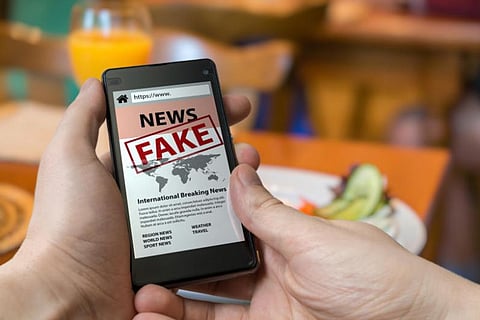
- Home
- Live Blog
- Breaking News
- Top Headlines
- Cities
- NE News
- Sentinel Media
- Sports
- Education
- Jobs

On a rare occasion on Wednesday, India became one of the signatories to the Christchurch Call for Action to remove extremist and violent online content. This global document, signed in Paris and spearheaded by French President Emmanuel Marcon and New Zealand Prime Minister Jacinda Ardern, brings together governments and technology giants to commit to actions that could remove extremist content from online spaces such as Facebook. The Paris event – a milestone of sorts in the sense that it is a rare instance where governments and the private sector have made similar vows with the same intent – was attended by leaders from Britain, France, Canada, Ireland, Senegal, Indonesia, Jordan and the European Union along with technology giants like Twitter, Google, Microsoft and others. India was represented by Ajay Prakash Sawhney, Secretary in the Ministry of Electronics and Information Technology.
It will be recalled that the Christchurch killer, who had stormed into a mosque and caused mayhem (many say the Sri Lanka Easter Sunday terror could be a retaliation to the Christchurch barbarity), posted the video of his massacre on Facebook. At the Paris event, Facebook, which has faced a lot of criticism for its failure to counter violent online content, has pledged to tighten restrictions and committed $7.5 million to fund research for technology to remove such content. The Paris document “outlines collective, voluntary commitments from governments and online service providers intended to address the issue of terrorist and violent extremist content online and to prevent the abuse of the internet as occurred during and after the Christchurch attacks”. This is significant, given that the commitment to counter online terror is voluntary, both from the governments concerned and the private players in the field. This initiative is supposed to get further fillip during discussions at the G7 Summit in Biarritz and the G20 summit in Osaka.
However, self-styled free speech activists – of whom there is no dearth in India – would campaign against the Paris document, saying the initiative, even as it is voluntary, runs counter to the interests of a liberal and democratic world order in which online spaces must be a free-for-all-and-for-everything business. It is such advocacy which has encouraged a whole gamut of unscrupulous elements in India – one of the worst victims of terror, mostly of the ‘jihadi’ kind – to unsettle social order and harmony. But these elements are dressed up as ‘public-spirited’ individuals espousing great liberal and egalitarian values, including so-called secular values, all of which, in fact, have terribly destabilizing effects. True, social media platforms such as Facebook provide a great level-playing field to citizens to articulate their views and get involved in sensible and reasonable debates on a plethora of issues, including national security, both internal and external. Nonetheless, such freedom cannot be at the cost of security itself, especially when it comes to the monstrosity of mad terror such as the one of Christchurch or Easter Sunday, as well as when it comes to the many sympathizers of non-state players who have such lame excuses as ‘injustice’ and ‘discrimination’ to commit to the cowardice of terrorizing innocent men, women and children. India has done well to join a much-needed global initiative to counter and defeat online terror content. But what is the epicentre of ‘jihadi’ terror – Pakistan – up to? We shall watch.